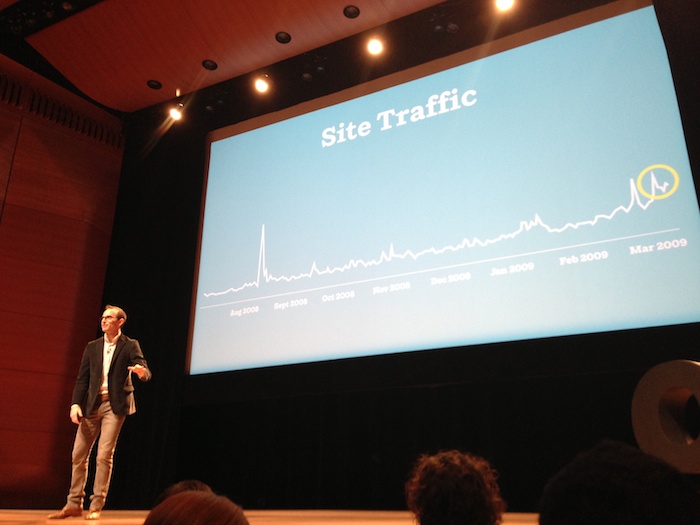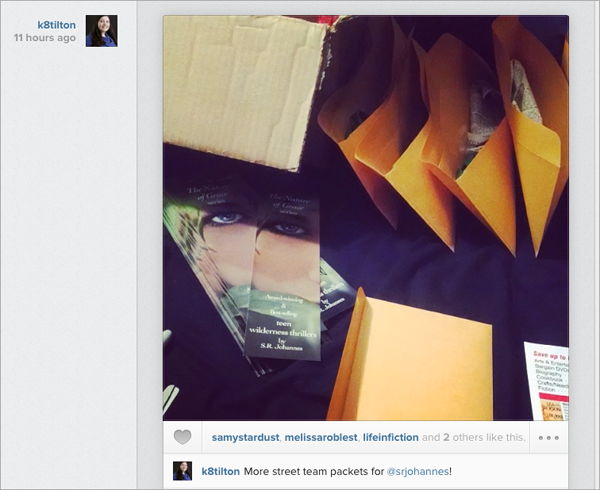Too often, we create simple narratives to drive our actions, or our inaction. For writers and other creative professionals, these narratives could be:
- It’s all about the story, I don’t need to know anything about publishing a book, marketing a book, or connecting with readers.
- Writers back in the day didn’t worry about Tweeting, why should I?
- My author-hero never did a book tour or media interviews, why should I?
- There’s only one thing that sells books, and it’s _______ (insert simplistic view of how things happen)
In other words: we look for simple narratives that tell us things we already believe. This allows us to take actions we are already comfortable with, or avoid actions that make us feel uncomfortable.
I have sat in plenty of meetings where survey data and analytics are reviewed, and listen to the key things that are pulled out that:
- Support the success of an existing strategy
- Avoid confronting hard truths that folks have been avoiding
- Avoid more work and behavior change due to what has been discovered
- Avoid seeking out MORE data to prove if the “results” are indeed correct or directional
That, if you aren’t careful, you (intentional or not), filter out cues you don’t like, and seek out cues that align to the narrative you want to see in the world.
But when we break out of these pre-existing narratives, we uncover the potential for growth. Growth in worldview – accepting that things are often more complex than they seem; or in growing as a person, developing new skills and experiences, even those that are uncomfortable.
For example: let’s say you self-define as an introvert. Now, if this is you, I 100% accept that you are indeed introverted, and that this is something we need to honor and take into consideration. It’s important. So how can you the introvert still develop your career as a writer? By taking the next step beyond a definition. By not using it as a blanket excuse to avoid any action or situation that is even remotely social. Introversion is not just “yes” or “no,” it is multifaceted and there are lots of ways to respect the ways you are introverted, while still taking social actions. That, if you want, that simple definition and identify can be an excuse, or a starting point.
An author I am working with recently asked (and I’m paraphrasing) the following with regards to engaging with readers beyond his books:
“But Dan, I write fiction. Don’t readers simply want another story from me? That’s all I care about from the writers whose series I read. Why do I need to consider learning about and connecting with my readers beyond what sells a story to them?”
First of all, I agree with him: the STORY is the center. Period. Write. Write well. Write what feels right to you. Publish with a frequency that works for your work style. Engross readers in the worlds you create. Repeat.
Done. Right?
Well, that is where you as a writer have choices. That should be enough, right? Well, it depends on what narrative you are clinging to:
- The one that frees you from having to do any more “stuff” in the publishing process. The one where it seems right and just to only have to craft stories. That anything else about finding and connecting with readers is a magical process that others should have to worry about.
- The one that sees authors such as Bella Andre, Rebecca Skloot, Hugh Howey, and Eric Ries, and sees people who are taking so many actions IN ADDITION TO CRAFTING WONDERFUL STORIES to help ensure their work connects with readers.
Yes, this is all optional, as is your decision to even publish at all. I have said this before, but writing for the sake of writing alone is a worthwhile endeavor – not everything needs to be shared or published.
Many authors DO have expectations they would like to meet around book sales and the number of people who find and enjoy their work. Should you be happy that 10 people bought and loved your book? YES! Does that make you feel completely satisfied as a writer? Maybe. Maybe not. Maybe you were hoping for 20 devoted fans. Or 2,000. Or 200,000.
THE OLDEN DAYS ALWAYS FEEL SAFE; THE PRESENT ALWAYS SEEMS SCARY
Too many writers dream of the “perfect” world whereby they write something in solitude, and then the world magically discovers it and amplifies it. Success in this instance is “pure,” because the body of work was so powerful that it intoxicated anyone who came in contact with it.
We glamorize “the olden days” when everything was easier, and “marketing” didn’t corrupt the purity of creative work. But this is not reality, it is merely ignorance of the complexity of a different time. Everything seems simpler and more pure in retrospect. Sure, successful authors in the 1950s or 1970s didn’t have Twitter, but they definitely networked and failed or succeeded based not just on the quality of their work, but on who they knew, and how well they managed their careers as writers.
REALITY IS MORE COMPLEX THAT PERCEPTION
There is a compelling documentary that focuses on an interview with former US Secretary of Defense Robert McNamara. I have a deep and profound respect for the sacrifices that others have made in the wars of the 20th century. It’s almost beyond my comprehension, to be honest, the level of sacrifice and the scope of what happened.
Looking back on some of these historic events, it can be easy to fall into a simple narrative that makes us feel comfortable. That one side was acting on the side of justice, and they prevailed because they were “right” and the other side was “wrong.”
As Mr. McNamara reflected on his role in aspects in and around the Vietnam War, one thing he said just floored me:
“We – including myself – were acting like war criminals.”
Themes he kept touching upon showed the complexity of actions taken on both “sides” of a war, and he indicated how big the roles of LUCK and EMOTION were in the process. That rational people got us into these situations that literarily put the world on the brink of utter destruction.
Sometimes we look back on history and try to find simple ways to characterize complex scenarios. Our brains are desperate for simple narratives that embody what we want to believe – what we already believe. And to hear Mr. Mcnamara say that he and his colleagues acted like war criminals is a level of honesty that requires us to reframe simple narratives in light of complex realities that are neither black nor white.
DARKNESS ON THE EDGE OF TOWN
Too often, I think writers don’t adequately flesh out what their goals are. I wrote about this in a post titled “Being a Success, Without Being a Bestseller,” which used an example from Bruce Springsteen’s seemingly odd decisions around making his album “Darkness on the Edge of Town.” For someone whose previous work drew success from the hopefulness of the open road of possibilities, the message of Darkness was very different:
He released an album of understated songs that adhered to a theme: coping with the limits of adulthood. Of what happens when adolescent dreams of greatness and freedom turn to the challenges of adult relationships, work, and living within boundaries. The “darkness on the edge of town” is the feeling of something keeping you in. Of the horizon not being an open road that promises new dreams to come true. That we are not all immortal and destined for greatness as we all may have believed in high school.
The album is ultimately hopeful, finding empowerment in facing these limitations. About redefining what it means to be a person living by principles in a world that is full of limits and challenges. It is an adult view of the world that does not rely on vague promises of success.
This is where we move beyond vague goals such as “I want to be a bestseller!” and move into the less sexy but more realistic conversation of: “Let’s talk about other milestones that define success,” and the concept of finding satisfaction in them.
CREATING MOMENTUM
Someone said this to me recently in regards to an online project he had developed:
“I just wanted to create something, and then kind of step back.”
The implication was that he would create it, others would give it momentum, and he could then step away from it and let it continue to succeed on it’s own.
But that rarely happens. There are many things that help success happen (including LOADS of luck!), but another is intention around working through the times when there is zero momentum. I was recently reflecting on my experience attending the 99u Conference last year, and all the in-depth stories of success I heard. The prevailing theme was the serious work behind each.
We often romanticize success, but the real stories behind them show a different picture: often a long road filled with failures leading up to that success. This image from Joe Gebbia from Airbnb is a good example of what “overnight success” really looks like:

It is well worth listening to his presentation from that conference, as well as the video from Jane ni Dhulchaointigh, inventor and CEO of sugru, both now available for free via YouTube.
So no, things were not easier “back in the day.” If you feel they were, consider your motivation for that narrative: where does it let you off the hook from taking the difficult actions of what it means to create work you are proud of, and how you connect that work in meaningful ways to other people?
Lastly: consider the EFFECT your work has in their lives – that most likely, your legacy will not be measured in book sales, but in the hearts and minds of others: those you know, those who surround you each and every day, and those touched by the work you create.
-Dan











